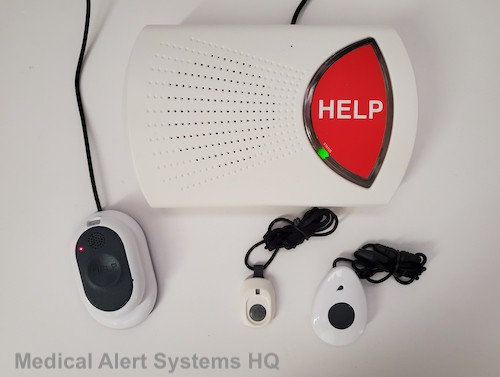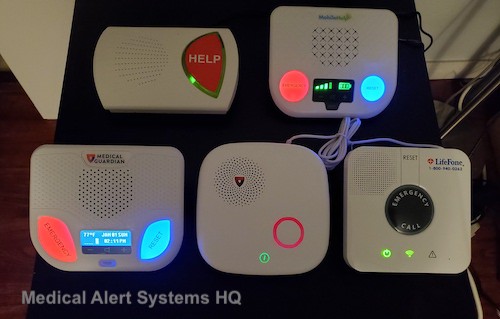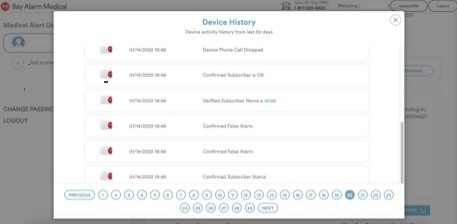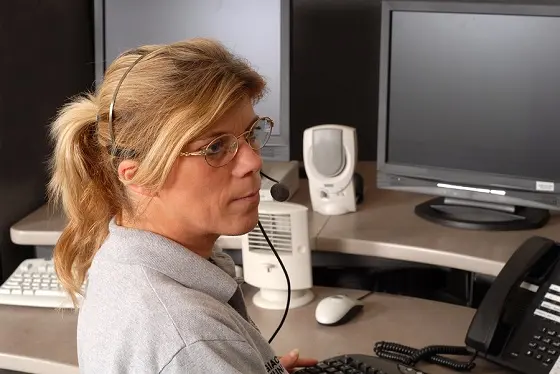Last Updated on April 2, 2022

When shopping for a medical alert system with monitoring help, you may have noticed very similar equipment offered by different companies. At times, the products look the same, and they appear to work just the same way. So does it make a difference if you choose to go with one company over another?
The short answer is Yes.
Each time you purchase a medical alert system, there are 3 main aspects to consider.
1. Medical Alert Equipment

Medical alert equipment consists of items like base units, neck or wrist buttons, and GPS devices. Some popular models are used by multiple companies.
We’ve found through our product purchase and testing that even if two medical alert companies use the same equipment models, their customizations can differ. This affects the product experience.
One area of customization is the type of cellular network that the equipment is connecting your emergency calls through on. A device could be capable of accommodating both a GSM (eg. AT&T or T-Mobile) and CDMA (eg. Verizon) network. Using the same equipment, one brand may connect customers using AT&T’s network while another uses Verizon.
Another customization is pairing an in-home base unit with an alternative button rather than the standard button. While buttons generally work the same way, a different button could change how the button push feels and the breadth of the connection range.
The actual product customizations affect the product usage experience, but it’s hard to tell without actually testing and experiencing the different products for yourself.
Since we compare and test out different products across brands, we take these differences into consideration when choosing the top systems. Hopefully, that helps you as you compare and shop what the best system for your needs.
Once you receive your medical alert equipment, be sure to also test it out from multiple locations and make sure you are happy with it.
If you like more information, we have another article that covers medical alert systems equipment customizations in even greater detail (read article). We go through real life differences we experienced between using the Mini Guardian and LifeFone VIPx. These are two products based on the same smallest GPS medical alert device model we’ve come across so far.
2. Monitoring Service
Medical alert companies connect customers to possibly different monitoring centers. This can lead to differences in the service experience.
Some companies operate their monitoring centers in-house while others engage the services of a call monitoring service company.
In the process of testing different companies, we discovered companies employing the same monitoring centers behind the scenes! Even so, we experienced some differences in the service experience. Just like with companies offering the same equipment, the monitoring center has customized its service experience differently for different brands.
Regardless of the arrangements, what is most important is to select companies that can demonstrate the quality of their call center infrastructure and services provided.
With the rise of overseas call centers, one of the top concerns customers have is whether the emergency support is provided in the US. Fortunately, for top US medical alert companies, monitoring is typically done through a US-based center.
In addition, consider if the service meets recognized industry certifications. For medical alert monitoring, the combination of being UL Listed and TMA (The Monitoring Association) Five Diamond certified is very highly respected.
Some top companies present alternative certifications as well, while others adhere to their own stringent internal standards.
3. Pricing and Account Administration

The third aspect that affects user experience is the pricing and administration of your medical alert account and customer support. Companies have different pricing plans, sales and billing processes, terms, and approaches to customer support.
Medical alert companies offer different kinds of pricing plans and there are extra costs associated with premium features like fall detection. We recommend choosing a company that fits your budget and that you find fair and easy to work with.
Many consumers overlook this point, but medical alert companies are less savvy in offering online account management features. With some companies, you may have to call in each time to update your emergency contacts or need to check on the details of your account setup.
In our experience, Bay Alarm Medical is the best when it comes to being transparent and having updated online account management processes for customers. Both their information website and after-sales online management dashboard share a lot of good information.
As a Bay Alarm Medical customer, we were able to update emergency contacts information online. We were impressed by how their online dashboard provided us with up-to-date time-stamped records of system events, such as when power loss has been detected and if an automated follow-up has been initiated. We found that this makes working with the company convenient and efficient.
Help me choose
If you need additional assistance with choosing a medical alert, you are welcomed to contact us here. Be sure to let us know more about your needs. That allows us to provide a more personalized response.
- Bay Alarm Medical In-Home Cellular Response Speed 46% Faster in 2023 - July 5, 2023
- Medical Alert Systems For Landlines - November 20, 2022
- The Truth About Long-Range Medical Alert Systems - May 1, 2022
In a hurry? Leave us your email, we’ll follow-up with the best tips.


